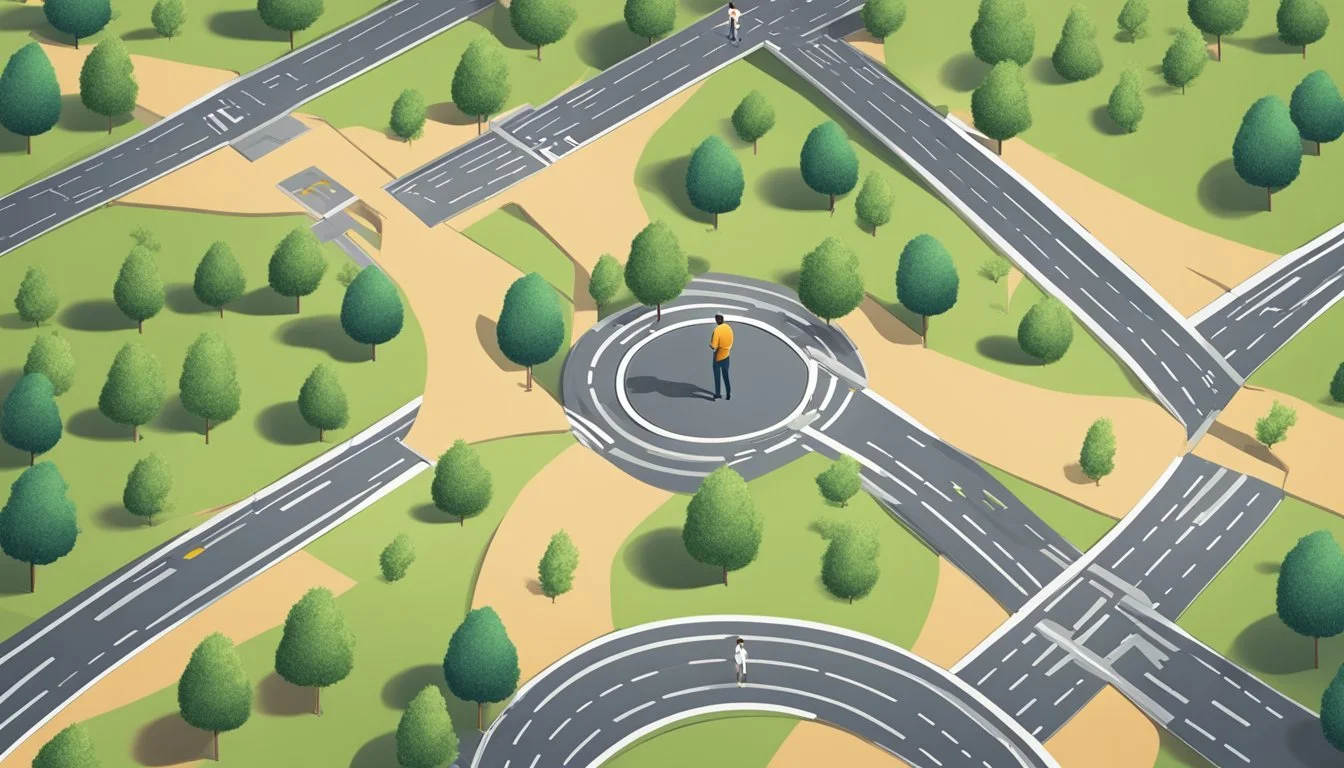13 Signs You're a Highly Spontaneous Person
Traits and Behaviors
Recognizing whether you are a highly spontaneous person can help you understand your unique approach to life. People who exhibit spontaneity often act on impulse, thrive in unpredictable situations, and embrace new experiences with enthusiasm.
Identifying signs of a spontaneous personality can provide insights into how flexibility and creativity play roles in your everyday decision-making. Whether it's about making quick plans or adapting swiftly to changes, spontaneity can shape your personal and professional life in meaningful ways.
1) You often make decisions on the spur of the moment.
A highly spontaneous person often makes decisions on the spur of the moment. This means their choices are made quickly, without extensive planning. They act based on current situations and their instincts.
Such individuals find excitement in unpredictability. Rather than sticking to a fixed routine, they embrace unexpected opportunities. For instance, they might decide to go on a weekend trip just because the weather is nice.
This trait can lead to unique experiences. Friends often find their spontaneity refreshing and exciting. Their decisions might include activities like an impromptu dinner outing or suddenly deciding to try a new hobby.
Making decisions without a plan doesn't mean they're reckless. They simply trust their ability to handle the outcomes. Spontaneity can bring a sense of adventure and novelty to everyday life.
2) You feel excited by the idea of last-minute trips.
A person who loves spontaneity often thrives on the thrill of unplanned adventures. They see last-minute trips not as a source of stress but as exciting opportunities. The unpredictability of such trips fuels their excitement and desire for new experiences.
For them, the chance to explore unknown places on a whim adds a layer of excitement to life. They embrace the unexpected, finding joy in discovering new destinations without meticulous planning. Spontaneous individuals savor the freedom and possibilities that come with last-minute travel.
Their adaptability means they can quickly adjust to new circumstances, making the most of any trip. They have a sense of adventure and view last-minute trips as a way to break the routine and inject some excitement into their lives. This readiness to embrace spontaneity often leads to memorable experiences.
Encounters with locals, hidden gems, and unforeseen events become the highlights of their spontaneous travels. By saying "yes" to impromptu trips, they continuously broaden their horizons and create lasting memories. The thrill of stepping into the unknown keeps their life vibrant and filled with wonder.
3) You enjoy trying new activities without much planning.
Highly spontaneous people thrive on the excitement of trying new activities with minimal planning. They find joy in unexpected experiences and often feel energized by the flexibility to explore new interests.
This trait allows them to embrace opportunities that arise on a whim, leading to a richer and more diverse set of experiences. Whether it's joining a last-minute hiking trip or signing up for a new art class, their willingness to say "yes" opens doors to novel enjoyment.
They don't feel the need to meticulously plan every detail, which can sometimes lead to a more genuine and relaxed experience. This adaptability allows spontaneous individuals to fully immerse themselves in the present moment without the constraints of rigid plans.
Their open attitude towards new activities also fosters personal growth and learning. By continuously engaging in different experiences without extensive preparation, they develop a versatile skill set and broaden their perspectives.
Spontaneous people often inspire others around them to step out of their comfort zones and try new things. Their enthusiasm for unplanned adventures can be contagious, encouraging friends and family to join in on the excitement. For more insights into fostering spontaneity, one can refer to these practical tips.
4) You rarely follow a strict daily schedule.
Spontaneous individuals rarely stick to a rigid daily schedule. They prefer flexibility in their routines, allowing them to adapt to new opportunities as they arise. Structured plans often feel restrictive and limiting to them.
A spontaneous person values the freedom to make decisions on the fly. They find excitement in the unpredictability of life. This might mean skipping the planned workout for a spontaneous road trip or switching up their morning routine based on how they feel.
While discipline can have its benefits, spontaneity brings a unique kind of energy. Instead of getting trapped in monotonous patterns, these individuals thrive on variety and change.
Living without a strict schedule doesn't mean a lack of productivity. Spontaneous people often find creative ways to get things done. Their unconventional approach often leads to innovative solutions and unexpected opportunities.
Routine can feel burdensome, stifling creativity and joy. By embracing flexibility, spontaneous individuals keep life interesting and dynamic. This mindset allows them to seize unexpected opportunities without hesitation.
True spontaneity involves a balance of living in the moment and being prepared for unpredictability. It's about creating space for the unexpected, leading to a life full of surprises and possibilities.
5) You thrive in unpredictable situations.
Spontaneous individuals often excel when faced with uncertainty. They find excitement in the unknown and are quick to adapt to changing circumstances.
Rather than feeling stressed or overwhelmed, they see unpredictability as an opportunity for growth. This mindset allows them to think on their feet and come up with creative solutions.
Their ability to remain calm under pressure is a key trait. By staying level-headed, they can navigate complex situations with ease. This adaptability is often reflected in both their personal and professional lives.
People who thrive in unpredictable situations are not afraid to take risks. They understand that stepping out of their comfort zone can lead to new experiences and opportunities. This willingness to embrace the unexpected sets them apart.
Their flexibility and open-mindedness are valuable assets. Being open to new possibilities means they can adjust their plans as needed, ensuring they remain effective and productive in any scenario.
6) You frequently change your plans based on your mood.
A highly spontaneous person often adjusts their plans according to their current mood. If they wake up feeling adventurous, they might decide to hike instead of going to work. This adaptability makes their daily routine unpredictable yet exciting.
Sometimes, a sudden craving for a certain type of food can lead them to change dinner plans completely. Instead of cooking at home, they might decide to try a new restaurant.
Emotional states greatly influence their decision-making. If they feel stressed, they might cancel a social gathering and opt for a quiet evening alone.
Their mood-driven approach often reflects a desire to live in the moment. Planning for the future may seem less important compared to immediate satisfaction and joy.
It's also common for them to switch travel plans last minute, turning a planned beach trip into a mountain adventure. Their friends and family are used to these rapid changes and usually remain flexible.
7) You love discovering new places on a whim.
A highly spontaneous person often finds joy in discovering new places without prior planning. They might wake up with no plans, then decide to visit an unknown city or a hidden spot nearby.
This approach to travel allows them to experience genuine, unfiltered adventures. They often enjoy the thrill of not knowing what to expect next.
For these individuals, the absence of a strict itinerary brings a sense of freedom and excitement. Their openness to exploring different environments leads to unique and memorable experiences.
Being unstructured in their travels means they can seize opportunities as they arise. This spontaneity often results in encounters with interesting people and unexpected sights.
Adventurers like this might drive along scenic routes, take random turns, and end up discovering quaint coffee shops or scenic overlooks. These unplanned journeys help them appreciate the beauty off the beaten path.
A spontaneous traveler values the flexibility to change plans on a moment’s notice. This might mean opting for a beach day instead of hiking when the weather changes.
8) You prefer flexible routines over rigid structures.
Highly spontaneous individuals thrive on flexible routines instead of rigid structures. They are more comfortable when their daily activities have room for change and adjustment. This flexibility allows them to take advantage of unexpected opportunities.
For instance, they might switch up their morning coffee run if they hear about a new café in the neighborhood. Spontaneous people often value the freedom to alter their plans on a whim.
This trait also makes them adaptable in social situations. They can easily accommodate last-minute invitations or impromptu gatherings. Their friends and family often appreciate this willingness to go with the flow.
Work environments that offer adaptable schedules suit them best. They can shift tasks based on priority without feeling constrained by strict deadlines or predefined workflows.
Such flexibility contributes to their mental well-being. It reduces the stress associated with having to follow rigid routines to the letter. These individuals often find themselves happier and more satisfied in their daily lives.
Research indicates that psychological flexibility is linked to better mental health. Being able to pivot and adapt is crucial for navigating life's unpredictable nature.
9) You Can Adapt Quickly to New Circumstances
Spontaneous people often excel at adapting quickly to new circumstances. When faced with unexpected changes, they don’t panic but instead embrace the situation with a positive mindset. This ability allows them to navigate complex situations with ease.
They are willing to take risks and step outside their comfort zones. By approaching new challenges with an open mind, they find solutions that others might overlook.
Flexible thinking is another hallmark of their adaptability. They can shift perspectives and adjust their approach as needed, making them versatile in various scenarios.
They handle pressure well. In high-stress environments, they maintain composure and focus on what needs to be done, which is a sign of their resilience and ability to adapt.
Individuals who can adapt don't see change as a threat but as an opportunity for growth. They learn new skills and gather insights from every new experience, continuously evolving.
Adaptable people stay calm and resourceful in the face of new information or sudden changes, unlike those who struggle to cope.
For more insights into signs of adaptability, consider looking at this resource, which provides detailed examples of resilient and adaptable traits.
10) You value experiences over possessions.
Highly spontaneous people often prioritize experiences over material possessions. They find joy in new adventures, whether it's traveling to a new city or trying an unusual hobby. This preference highlights a deeper appreciation for moments and memories.
Experiences provide an opportunity for personal growth. Each new experience brings a chance to learn and adapt. Material possessions, on the other hand, often remain static.
For spontaneous individuals, life is about living in the moment. They place greater worth on the satisfaction derived from experiences than on the temporary joy of acquiring new items.
People who favor experiences over possessions are often more adaptable. They adjust easily to changing circumstances and embrace new opportunities with enthusiasm.
Pursuing experiences also fosters a sense of connection. Spontaneous individuals often engage with others through shared activities, creating lasting bonds and memories.
Valuing experiences can lead to a richer, more fulfilling life. It encourages them to explore, discover, and enjoy the world around them, making each day unique and exciting.
For more insights on valuing experiences over possessions, read this article.
Spontaneity and a love for experiences often go hand in hand, highlighting an open and adventurous approach to life.
11) Your Friends Describe You as Unpredictable
People who are highly spontaneous often hear from friends that they're unpredictable.
Their decisions might vary greatly from one day to the next. This can lead others to view their behavior as erratic.
They may suddenly change plans. One moment they might be heading to a coffee shop; the next, they could be taking a road trip.
This unpredictability can make social interactions exciting. Their friends never quite know what to expect, which can lead to a vibrant social life.
Sometimes, their plans seem spontaneous even if they’ve thought them through carefully. The outcome is the same - their friends see them as flexible and adaptable.
In social circles, these individuals often bring a sense of adventure. Their unpredictable nature can introduce friends to new experiences and activities they might not have considered.
They thrive on the thrill of the unknown. While some might find it unsettling, many appreciate the spontaneity they bring to everyday life.
12) You enjoy surprise parties and unplanned gatherings.
Highly spontaneous people thrive in environments where unpredictability reigns. They find joy in surprise parties and impromptu gatherings.
These individuals are often the ones who eagerly anticipate the unexpected events. They relish the excitement that comes with not knowing what to expect.
Unplanned gatherings provide a sense of adventure. They appreciate the freedom from rigid schedules, enhancing their enjoyment.
Attending surprise parties allows them to bask in the moment. The spontaneity of these events mirrors their own approach to life.
People who enjoy unplanned activities are generally adaptive. They can effortlessly switch gears and embrace whatever comes their way.
13) You often seek out new foods or restaurants spontaneously.
Many spontaneous individuals have a knack for culinary exploration. They frequently find themselves wandering into new restaurants or cafes without prior planning. This gives them a chance to continuously experience fresh and diverse flavors.
They may hear about a new restaurant from a friend and decide to visit it on a whim. This approach adds excitement and variety to their dining experiences.
Trying new foods or restaurants on the spur of the moment keeps their taste buds engaged. It also allows them to discover hidden gems in their local community. Spontaneous eaters are always on the lookout for unique culinary experiences.
They often prefer the thrill of the unknown over sticking to a fixed list of familiar eateries. This trait keeps their dining adventures exciting and unpredictable, making each meal an opportunity for discovery.
Those who are spontaneous about their food choices typically avoid routine and enjoy mixing things up. This inclination to explore can lead to delightful culinary surprises and memorable meals. For them, the spontaneity adds a layer of fun to the simple act of eating out.
Exploring new cuisines and dining spots not only satiates their hunger but also feeds their curiosity and adventurous spirit.
Understanding Spontaneity
Spontaneity is characterized by an inclination towards living in the moment and embracing unexpected opportunities. Spontaneous individuals tend to exhibit certain traits and behaviors that set them apart from more structured personalities.
Definition of Spontaneity
Spontaneity involves making decisions based on the immediate situation rather than pre-planned strategies. A person who acts spontaneously often relies on intuition and gut feelings.
This mindset is linked with flexibility and adaptability, enabling individuals to navigate changing circumstances with ease. It contrasts with a fixed mindset, which might shy away from unpredicted events due to the lack of preparation. This quality is often admired in social and professional environments where rapid decision-making can be beneficial.
Characteristics of Spontaneous People
Spontaneous people thrive on variety and change. They are often described as adventurous and open to new experiences. Risk-taking is a common trait, as these individuals do not fear potential failure but see it as part of the learning process.
They tend to be outgoing and energetic, enjoying social interactions and often bringing a sense of excitement to group activities. Spontaneous individuals can also be seen as creative problem solvers who approach challenges with innovative thinking.
Their impulsive nature, while sometimes perceived as lack of responsibility, can lead to unexpected and rewarding experiences. This carefree attitude is balanced by a practical ability to adapt and overcome obstacles as they arise.
The Psychology Behind Spontaneity
Spontaneity incorporates crucial elements like cognitive flexibility and emotional intelligence. Understanding these aspects helps in appreciating the mental frameworks that support spontaneous behavior.
Cognitive Flexibility
Cognitive flexibility refers to the mental ability to switch between thinking about two different concepts or to think about multiple concepts simultaneously. People who are cognitively flexible are adept at adapting to new, unexpected situations.
They can easily transition from one task or thought process to another, which makes reacting to spontaneous events more manageable. Such individuals often show creativity and problem-solving skills, adapting quickly to changes without becoming flustered.
Additionally, high cognitive flexibility allows for a more open-minded approach to life's unpredictabilities. It aids in seeing situations from various perspectives, which is crucial for making spontaneous decisions that might not conform to routine or established patterns.
Emotional Intelligence
Emotional intelligence (EI) plays a significant role in spontaneous behavior. EI includes the ability to recognize, understand, and manage one's own emotions and the emotions of others.
Individuals with high emotional intelligence are often better at handling spontaneous situations because they can remain calm and composed under pressure. They possess the capacity to empathize with others, which can lead to more meaningful and effective interactions during impulsive moments.
Moreover, highly emotionally intelligent individuals demonstrate resilience. This allows them to recover rapidly from setbacks that might occur due to their spontaneous actions. Their ability to maintain emotional balance helps them navigate the unpredictable nature of spontaneous living, ensuring their decisions are well-regulated and thoughtful.
Benefits of Being Spontaneous
Being spontaneous brings numerous advantages, such as fostering creativity and improving social interactions. These benefits can significantly enhance one's personal and professional life.
Increased Creativity
Spontaneity often leads to increased creativity by encouraging out-of-the-box thinking. When individuals act on impulse, they break free from the routine ways of approaching problems. This freedom helps the brain to generate innovative ideas and solutions.
Engaging in spontaneous activities reduces the tendency to overthink, which can hinder creativity. Spontaneous people are more likely to experiment, explore new ideas, and embrace unpredictable situations. This open-minded approach can result in unique and creative outcomes.
For instance, solving problems creatively is one key benefit highlighted by Bolde. Through spontaneous actions, people can discover new interests and hobbies that fuel their creativity.
Enhanced Social Relationships
Spontaneous individuals often excel in social settings due to their flexibility and openness to new experiences. They are typically more willing to engage with others, which can lead to more meaningful and diverse relationships.
By accepting last-minute invitations and participating in unplanned events, spontaneous people avoid social monotony. According to LifeHack, they are less likely to turn down spontaneous social opportunities, making them more approachable and interesting companions.
Additionally, this spontaneity extends to initiating conversations with new people, which can broaden one's social network. Engaging in diverse social interactions helps build resilience and adaptability in various social contexts, as noted by Thrive Global.















